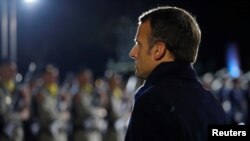A coalition of European militaries ready to react to crises near the continent's borders was launched Wednesday with Finland becoming the 10th country to join, amid calls by French President Emmanuel Macron for a "real European army."
The French-led initiative would not conflict with the almost 70-year-old, U.S.-dominated NATO alliance, proponents say, but reflects in part concerns about a more isolationist United States under President Donald Trump.
The European Intervention Initiative took official shape in Paris after months of negotiations with Germany, who France wants at the center of the force.
Macron proposed the idea more than a year ago but was met with skepticism by other European Union nations, the idea coinciding with the EU's launch of a landmark defense pact meant to promote joint military investment.
Germany, Belgium, Britain, Denmark, Estonia, the Netherlands, Spain and Portugal have all given their green light for the French-led move. It will see members collaborate on planning, on the analysis of new military and humanitarian crises, and on eventual military responses to those crises.
"In an environment where threats and upheavals of a geopolitical or climatic nature are multiplying, the initiative must send the message that Europe is ready, that Europe is capable," a French defense ministry official said.
The imminent departure from the EU of Britain, long opposed to EU military collaboration outside NATO, has revived talk of defense cooperation — as have concerns that Trump might prove less willing than his predecessors to come to Europe's defense in the face of a newly assertive Russia.
The initiative does not "contradict or circumvent the EU's historic defense efforts, nor those of NATO," the defense official said. "On the contrary, it will only improve interoperability between the participating countries."
On Tuesday, Macron called for a "real European army" to reduce dependence on the United States.
European Commission President Jean-Claude Juncker has long been a vocal supporter of the idea that the EU should have more common defense capability, separate from NATO.
Not everyone is convinced.
"Pragmatic advances and patient construction with those who are ready and willing for a political convergence in defense are infinitely preferable to totally illusory and even counterproductive slogans and incantations," said Arnaud Danjean, a member of the foreign and defense committee at the European parliament.
